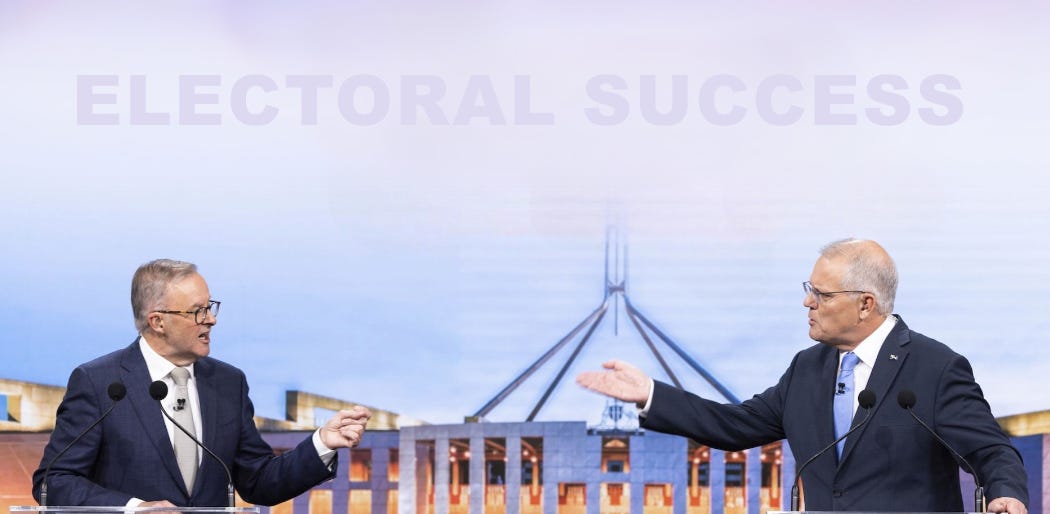Table of Contents
David Leyonhjelm
David Leyonhjelm was elected to the Senate in 2013 and 2016, resigning in 2019. He is the author of two books and has operated his agribusiness consulting company for over 30 years. He has degrees in veterinary science, law and business.
One of the many benefits of being a member of parliament is the amount of advice received. It is an endless bounty. Quite a lot relates to character assessments, such as, ‘You’re a useless parasite.’ But some, not a lot, is actually constructive, intended to help the member get re-elected. Sometimes it ought to be heeded.

I would not want to be leader of the opposition – it’s a tough job. The volume of advice is an order of magnitude greater than for an ordinary member and very little is constructive.
The challenge is to recognise useful advice when it arrives. What policies could be adopted to convince swinging voters? Will the party’s ‘Labor-lite’ faction agree to it?
Although they have been disappointingly ineffective for as long as I can remember, I broadly prefer the coalition in government to Labor. They just do less harm. With that in mind, I’ve decided to give the opposition leader three pieces of advice. It’s not what I would do if I was prime minister; I’m simply offering constructive advice.
First, while it is abundantly clear that the pursuit of net zero is devastating the economy, the challenge is to find a way to abandon the policy without losing votes.
Agriculture and regional areas have been suffering badly since it was abandoned.
I believe the answer is China. Certainly, China is building wind and solar farms, but there are far more coal fired and nuclear power stations under construction. Its aim is to achieve net-zero emissions by 2060, perhaps. Moreover, the country’s greenhouse gas emissions are so substantial they completely negate any reductions that Australia might achieve.
The solution is for Australia to adopt the same policies towards climate change as China. Whatever China says and does on the issue, we will do the same. In practical terms it means we will say one thing and do another.
This is electorally saleable for two reasons. First, China is no longer a developing country, as anyone can see. Second, more importantly, China is by far our most important export market, buying more than twice as much as our next biggest market. It makes sense to be in alignment. It also makes more sense than emulating economically irrelevant countries such as Germany and the UK, both of which are suffering similar devastation from net zero policies.
Second, Australia has a massive government spending problem which is not only contributing to inflation but creating a massive debt problem that will last for generations.
The problem is, Australians consistently vote for candidates that promise both tax cuts and increased government spending. The challenge is to find an electorally acceptable way to balance the budget.
My solution is, first, to eliminate bracket creep by indexing income tax rates. This is not a new idea, but it will win votes; average Australians dislike paying tax rates originally intended to apply to high income earners. It will also starve the government of increasing tax revenue.
Of course this will necessitate cuts in government expenditure, although not immediately. I propose a simple policy of strictly means testing all welfare, with no exceptions including the NDIS. This will be presented as ‘more welfare for those who need it, less for those who don’t’.
Of course it would be phased in, after full consultation and allowing for special cases, but the aim is to ensure the public debate is about who should be eligible for welfare, rather than assuming it is a right and whether it is enough. And if it’s bundled with tax indexation, it will be persuasive.
But some, not a lot, is actually constructive, intended to help the member get re-elected. Sometimes it ought to be heeded.
My third recommendation relates to immigration, on which most people want a substantial reduction. The challenge is to significantly reduce it (not merely 20 per cent as the coalition currently proposes) without worsening shortages of essential skilled occupations, particularly in the building trades.
The debate should be about quality rather than quantity. That is, which skilled migrants in specific sectors are required, not hundreds of thousands of foreign students whose real intention is to settle permanently in Australia.
An incentive should be created for universities and colleges to boost their training of domestic students by linking it to permitted foreign student numbers. First, block most foreign students entirely (the universities all support Labor anyway), then allow numbers to increase in proportion to the number of domestic students in categories where shortages are a problem. Domestic training and education will rapidly become a priority.
The requirement for backpackers to spend time in the country in order to extend their visas should also be reinstated. Agriculture and regional areas have been suffering badly since it was abandoned.
So here it is – my constructive advice for the opposition leader. I’m looking forward to him heeding it.
This article was originally published by Liberty Itch.









